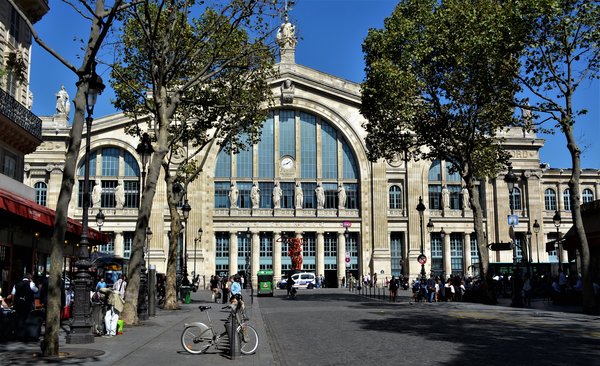There’s no shortage of public transportation in Paris—we’ve got the train, metro, bus, tram, and even a bike share. It’s the fastest and cheapest way to get around the city, letting you pack more into your sightseeing schedule.
We know, we know, the colored lines are confusing, the names of the stations are all in French and you don’t want to miss a moment of street life in Paris. But life happens on the metro, too! Whether it be buskers on Line 2, views of the Eiffel Tower and the Seine on Line 6 or a scenic bus journey through the Latin Quarter, public transport offers some of the best and quickest ways of accessing the City of Light. Follow our tips and tricks to access Paris’ public transport like a pro!
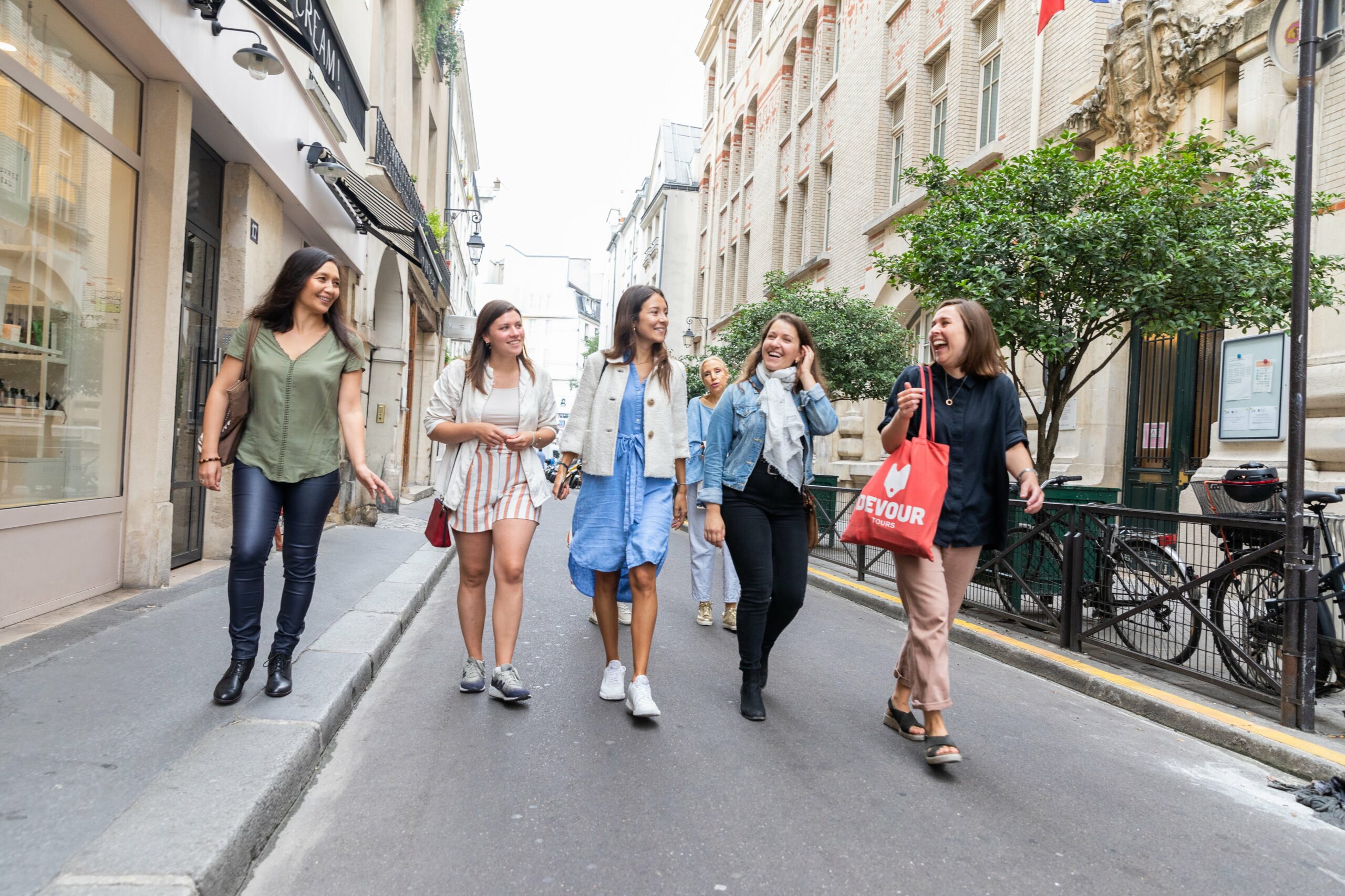
Getting your tickets
There are ticket machines in every main line train and metro station, all of which have an English language function. These “t+” tickets, at €1.90 each, can be used for a single journey on the metro, bus, tram or RER train within the city limits.
If you’re making a few journeys, it’s best to buy a book of 10 single-use tickets at the reduced price of €16.90. But beware: these tickets will not get you to Versailles, the airport, or any other out-of-town destination. For journeys to either of the above and other suburban destinations, you need to buy one-way tickets for a set fare, purchased at the same ticket machine.
If you know you’ll be doing a lot of traveling, there’s also the Paris Visite pass, which offers unlimited five-day travel within Paris, for €38.35. If you’re traveling longer distances, like to Champagne, there is a different ticket machine which is only available in mainline train stations.
Whichever ticket you choose, make sure not to throw them away until your journey is complete and you’ve exited the barriers at your destination! Frequent spot checks by ticket inspectors can happen on your way out of the station. You need to be holding a valid ticket to avoid the fine, which can be up to €60.
Forms of public transportation in Paris
Metro
With 301 metro stations, 16 lines and 86 iconic art deco station entrances, Paris boasts one of the most extensive and well-serviced underground networks in the world. With frequent trains running from 5:30 a.m. until 1 a.m. daily (and later on weekends), you can zip around the city quickly and easily. This is especially handy if you need to take a load off between sightseeing!
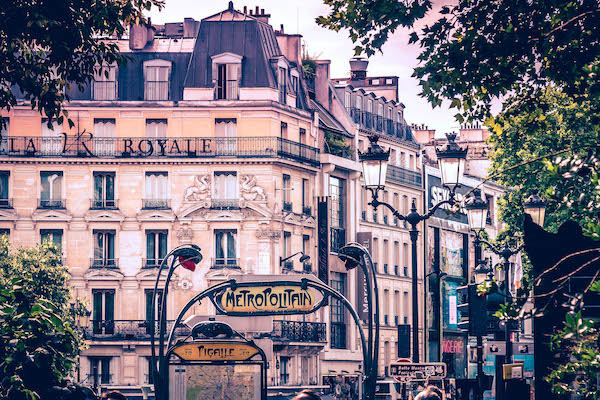
Transfers, however, can take a while, especially at stations with three or more converging lines. Stations are situated usually within ten minutes’ walking distance from one another, so don’t be afraid to walk one or two stops to avoid a change—it’s often nicer than spending an extra 15 minutes navigating the endless tiled tunnels.
Although all lines are best avoided during rush hour, different lines have different personalities, which come through as you get to know them. Line 4 is one of the city’s oldest, Lines 1 and 9 are known for pickpockets, Line 13 is famously overcrowded at any time, and Lines 2 and 6 are the most scenic, popping out above ground and offering unexpected views into Parisian apartments. Line 6 crosses the Seine, affording beautiful views of the Eiffel Tower and usually featuring buskers jumping between carriages.
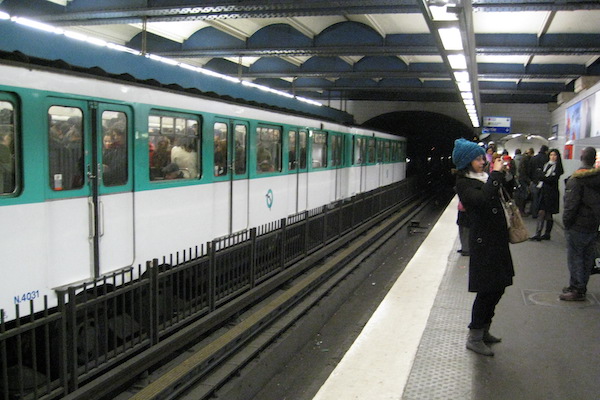
Bus
The bus provides easier accessibility for people with disabilities while allowing everyone a glimpse of the sights. Buses tend to be a little less reliable than the metro, especially at rush hour when the heavy Parisian traffic can impose a complete standstill. The same single-use ticket rules apply for the bus as for the metro; just make sure to validate your ticket as you board. You can buy a single-use ticket from the driver for €2, or use one ticket from your book of 10.
Some routes are nicer than others, and we recommend the 69 bus route, which takes you all the way from the Eiffel Tower, via the Louvre, to the famous Père Lachaise cemetery in the east of the city. It’s also a great way to see the narrow streets of the Marais, one of the city’s best-loved boutique shopping destinations and off-the-beaten-track neighborhoods.
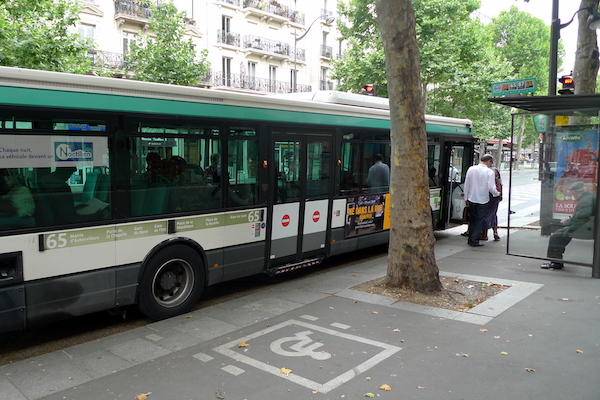
Vélib’
The city’s bike network has seen huge changes over the past few years, encouraging more and more local cyclists onto the streets. Wide bike lanes, separate traffic lights and car-free zones have made cycling in Paris safe and enjoyable—just beware of other cyclists!
Paris’ celebrated bike-sharing scheme, Vélib’, is an easy and cheap way to get around on two wheels. €5 buys you a one day pass, or for €15 you can access the service for a week. Rides of less than 30 minutes are free, unless you opt for an electric bike, which has a €1 fee each time.
We think that bike-sharing is the most fun, easiest and greenest way to get around the city. Just make sure you’re following the rules of the road.
Tram
The tram requires the now-familiar t+ single journey ticket, and like the bus, you must validate it as you board. Contrary to the bus, however, you must always buy a ticket before you board. Trams are only in operation on the outskirts of the city, and you most likely won’t come into contact with them unless you’re staying out there, or if you’re visiting Paris’ open-air summer cinema or a stadium.
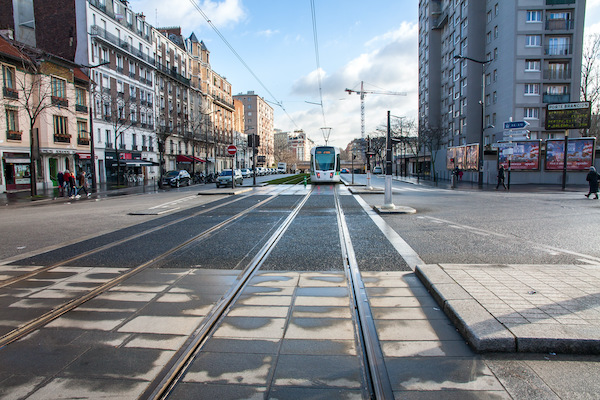
Safety on public transportation in Paris
Paris is an international metropolis, and like all big cities, there is some petty crime. Don’t let this put you off using the metro—as long as you keep your wits about you, avoiding pickpockets isn’t hard.
Pickpockets can come in many forms, and they’re usually obvious. In Paris, you might see young girls with clipboards asking you to fill in fake questionnaires, people trying to re-sell metro tickets, or groups of girls all boarding the metro at the same time. These sights should be a warning sign to be even more aware of your belongings.
As you use the Parisian metro system, notice that trains and metros are usually quiet. No self-respecting Parisian makes phone calls or has loud conversations on public transport, and we say follow the locals’ lead! Keep your belongings hidden and your voice down to avoid unwanted attention.
The one exception to the noise rule are the buskers playing accordions or Edith Piaf songs on the metro. They’re not part of a scam—we’re always ready to offer up a couple of coins when we enjoy the music.
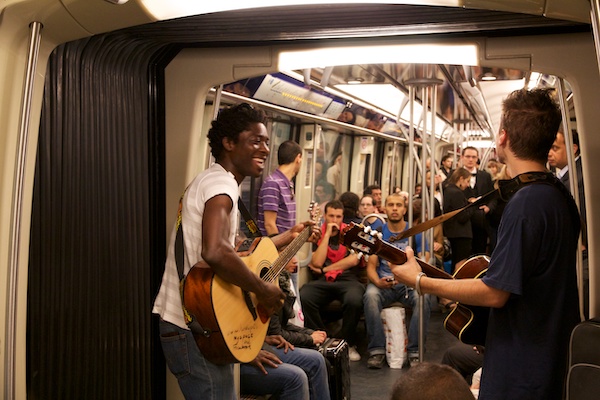
Accessibility and other travel tips
Throughout Paris’ extensive metro network, there are few elevators and escalators, which means it’s better to take a cab if you have lots of luggage, are disabled, or are traveling with a stroller. Most stations require walking up and down steps, and although the metro isn’t far underground, it can be physically taxing.
Despite the fact the metro can be difficult to access, there are often elderly, pregnant or disabled people sharing the line with you. Give up your seat for these people, as others will for you if you’re traveling for two!
If you’re traveling on a weekend, it’s good to check your route using the official Paris public transport site. Some lines undergo maintenance on weekends, and city map applications aren’t updated. Accurate, real-time information cannot, unfortunately, be found on Google.
It’s also good to know that not all train doors are automatic, and most require that you press a button or turn a lever to open them. And pay attention when the buzzer sounds—that’s your cue to jump on or off before the doors close!
Traveling further afield with the RER or train
The RER, a metro-train hybrid, is a double-decker high-speed train used by commuters living in the Parisian suburbs, connecting them to the city center. While quick and convenient, it can be challenging for weary travelers to navigate given that all of the lines splinter off from one another to cover more ground. That means you have to be particularly careful to board the right train that will fork off in your desired direction—it’s a system that even locals find tricky, so don’t be afraid to ask a fellow passenger if you get stuck.
Tickets for the RER are bought at the same machine as other public transportation tickets, but your €1.90 t+ ticket will no longer work if you’re going outside the city limits.
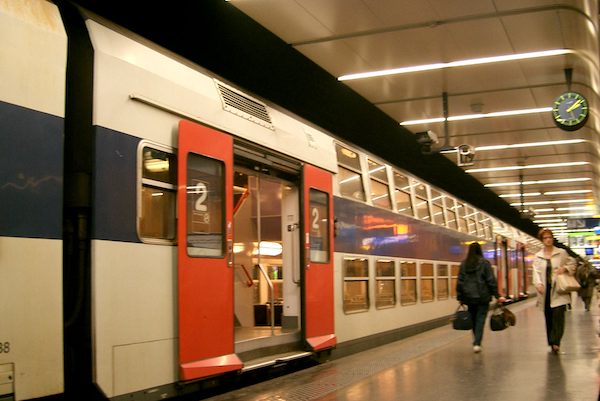
Mainline stations, such as Gare du Nord and Gare Montparnasse, connect both the local suburbs and regional trains from all over France to Paris. These stations are usually a lot more densely populated, and require you to be aware of your possessions at all times. Wear backpacks in front of you, and don’t leave luggage unattended.
In contrast to these busy hubs, the national and regional trains themselves are quiet and full of plugs and USB ports, making them the perfect de-stress zone. If you want to travel nationally in France, rail is definitely the way to do it, but be sure to buy tickets in advance as it can become more expensive closer to the date of travel.
